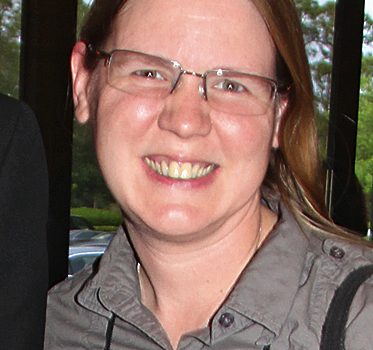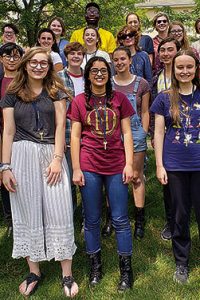Half a Year Online by Karen Burnham
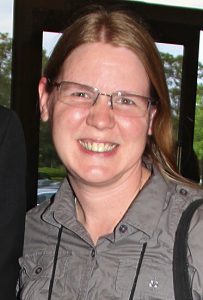
At the beginning of 2018 I had no idea that I would end up reading so much short fiction from so many different venues that I would need a spreadsheet to keep track of it. Since I started reviewing online short fiction for Locus in the August issue (after the sad passing of Gardner Dozois – I very much wish I could read his 2018 year-end column this year) I’ve read over 290 stories from 28 different venues, and that’s only a fraction of what’s available out there online. (That really only covers the last half of 2018, so please forgive my many oversights from the first half of the year.)
My focus is on short fiction that is available primarily electronically, and I toyed with the notion of limiting that to SFWA-qualifying venues simply to narrow the scope a bit. Then I realized that would mean missing out on some of the most innovative volumes I read this year, such as issue #9 of Capricious. That was a special issue dedicated to Gender Diverse Pronouns and was a great showcase for stories that use all kinds of different gender identities and pronouns in all kinds of different ways. Two that really stuck with me were pieces by Bogi Takács and A.E. Prevost, but each story had something interesting to offer. Another non-pro venue that has a unique viewpoint is Big Echo. I only read issue #9, but their intention to be an “online journal of critical science fiction” lends itself to some very incisive pieces. Although, more than most venues, I would recommend an extra copy editing pass for this one, stories by Vajra Chandrasekera and Saba Waheed definitely stood out. All of that is to say, if you stray away from the “mainstream” of speculative short fiction, there’s a lot of fabulous stuff out there to enjoy.
Nearer to that main current, there were some significant milestones in short fiction publishing this year. To start on a bittersweet note, Shimmer magazine announced in the Summer that it would be closing, which gave it time to line up an amazing TOC for its final issue in November. Shimmer always had a unique style, shading towards the bizarre, and they doubled down on that in their triple finale issue, which stands as a worthy culmination of their efforts. There’s something for everyone here, from fairy tale retellings to spaceships of the dead to genetically engineered dinosaurs who enjoy roller derby. Relative newcomer Wren Wallis provides the perfect grace note in the final story of the issue.
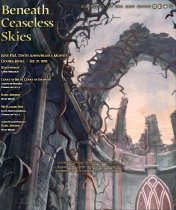 In happier news, Beneath Ceaseless Skies hit an admirable milestone this year, celebrating their tenth anniversary in style this Fall, with two double issues including stories from well established authors returning to favorite worlds (such as Fran Wilde, Alliette de Bodard, and Chris Willrich) as well as well as newer voices such as Jaymee Goh and Bonnie Jo Stufflebeam. Overall this year I was happy to reacquaint myself with how much range and depth the authors and editors bring to their “literary adventure fantasy” territory, and I especially appreciated work here from Yoon Ha Lee, A. Merc Rustad, Jordan Kurella, and Karen Osborne (who wrote one of my favorite stories of the year “The Bodice, The Hem, The Woman, Death”).
In happier news, Beneath Ceaseless Skies hit an admirable milestone this year, celebrating their tenth anniversary in style this Fall, with two double issues including stories from well established authors returning to favorite worlds (such as Fran Wilde, Alliette de Bodard, and Chris Willrich) as well as well as newer voices such as Jaymee Goh and Bonnie Jo Stufflebeam. Overall this year I was happy to reacquaint myself with how much range and depth the authors and editors bring to their “literary adventure fantasy” territory, and I especially appreciated work here from Yoon Ha Lee, A. Merc Rustad, Jordan Kurella, and Karen Osborne (who wrote one of my favorite stories of the year “The Bodice, The Hem, The Woman, Death”).
Lightspeed also hit a major milestone, with its extra-large 100th issue appearing in September with ten original and ten reprint stories. This featured great work by Ken Liu, Sofia Samatar, and Sam J. Miller, among others. While I still find the official division between “science fiction” and “fantasy” in its pages (a legacy of two magazines merging a few years ago) more distracting than useful, Lightspeed continues to put out great work. I appreciated stories by a mix of established and newer writers such as James Beamon, Mel Kessel, Theodore McCombs, Theodora Goss, Matthew Hughes, and Lizz Huerta.
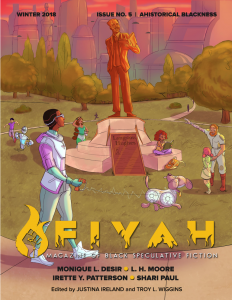 Winning a World Fantasy Award this year, Fiyah has rapidly established itself as a top-tier venue. I saw three of their issues this year, all themed: #5 (Ahistorical Blackness), #7 (Music) and #8 (Pilgrimage), all excellent. I especially appreciated work by Monique L. Desir, Shari Paul, LaShawn M. Wanak, Tade Thompson, and Tuere T.S. Ganges, but there wasn’t a bad story in the bunch. The poetry in the Music-themed issue was also spectacular.
Winning a World Fantasy Award this year, Fiyah has rapidly established itself as a top-tier venue. I saw three of their issues this year, all themed: #5 (Ahistorical Blackness), #7 (Music) and #8 (Pilgrimage), all excellent. I especially appreciated work by Monique L. Desir, Shari Paul, LaShawn M. Wanak, Tade Thompson, and Tuere T.S. Ganges, but there wasn’t a bad story in the bunch. The poetry in the Music-themed issue was also spectacular.
I always approach Tor.com and Clarkesworld with the highest possible expectations, which means that I am occasionally disappointed. However I am much more often delighted, and they both had solid lineups during my time reviewing this year. I especially appreciate Neil Clarke’s continuing commitment to translated fiction from China, which delivered some of my favorites this year such as work from Xing He, Qi Yue, Luo Longxiang, and Zhang Ran. Clarkesworld also featured strong work from D.A. Xialoin Spires, Lavie Tidhar, Kij Johnson, Kelly Robson, Elly Bangs, Suzanne Palmer, Nina Allen, and Alan Bao, with possibly my favorite story of the year coming from relative newcomer Simone Heller with “When We Were Starless”. Some of my favorite pieces in Tor.com came from Rich Larson, who is never less than entertaining, Tina Connolly, Greg Egan, Brenda Reynado, and Daryl Gregory.
Strange Horizons had a good year, and I especially appreciated those pieces that were more experimental in their forms, such as “How Pleasant the Red Bloom” by Lucy Harlow, and “Tamales in Space, and Other Phrases for the Beginning Speaker” by Gabriela Santiago. I also especially appreciated work from Eleanna Castroianni, Y.M. Pang, Isabel Yap, Celeste Rita Baker, and Margaret Killjoy. The Summer special issue on the Southeastern USA, guest edited by Sheree Renée Thomas, was particularly strong.
I want to highlight some new-to-me venues that I read this year. While I may only have seen a single issue from some, they are doing great work bringing different voices and perspectives into the fold. Augur is a magazine dedicated to Canadian speculative fiction, and Issue 1.2 had some outstanding stories by authors such as Aimee Ogden and A.C. Wise. Omenana features speculative fiction from the African diaspora. I only saw Issue #12 (Theme: Our Darkest Selves), which was excellent. My favorite in it is from Tiah Marie Beautement, but the other three stories are also very well done – shading more towards horror, as appropriate for the theme. I saw Issue #5 of Liminal Stories, with good work from Vanessa Fogg and Rachel Halpern. Red Sun is a magazine dedicated to work by and for military veterans. Issue #3, coming in the Fall, was largely horror, but the lead story by Aeryn Rudel really stuck with me. Kaleidotrope‘s Autumn issue had interesting work by Emma Osborne, Curtis C. Chen, and Timothy Mudie. Deep Magic (“clean fantasy and science fiction”) had a lovely story by Charity West to lead off their Fall issue, as well as interesting pieces from Cameron Johnston and Tim W. Boiteau.
Some other venues that folks may not be thinking of when it comes to short fiction are partnerships with different tech enterprises. Future Tense is an effort from Slate in partnership with New America and Arizona State University, publishing a short story each month along with a nonfiction companion piece. I didn’t see every story they did in the second half of the year, but their three-month series on Sports had great work from Maureen McHugh and Deji Bryce Olukotun. Terraform is a fiction venue associated with Motherboard from Vice. Publishing roughly a story a week, it had some impressive stories this year, of which my favorite was “Music for the Underworld” by E. Lily Yu.
 There’s nothing better than discovering new-to-me voices and reading stories with ideas I haven’t seen before. Obviously, representation is having a heyday right now; I’d say especially in the online realm our futures and fantasy worlds are gloriously and fabulously LGBTQ (or QUILTBAG, one of my favorite all-inclusive acronyms), with all kinds of gender expression and identities welcome as well. There are also some new-to-me authors who seem to be having, or approaching, breakout years. P. Djèlí Clark had a fantastic novella come out from Tor.com publishing, alt-history adventure The Black God’s Drums (set in a world so rich it could easily support a novel or series), and also a short story in Fireside that will likely be on many award ballots: “The Secret Lives of the Nine Negro Teeth of George Washington”. Simone Heller is someone I’ll be looking out for. If ISFDB is to be believed, her amazing story “When We Were Starless” in Clarkesworld is only her second sale. Other authors that I noticed publishing multiple stand-out stories include James Beamon, Jordan Kurella, and Eleanna Castroianni. I may be only six months into this new opportunity and adventure that Locus has offered me, but so far I’m having a lot of fun. Thanks to everyone for their kindness, especially the editors who have made sure to send me copies of their magazines and the readers sticking with me on my learning curve as I adapt to the drinking-from-a-firehose deluge from the world of online short fiction. Onwards to 2019!
There’s nothing better than discovering new-to-me voices and reading stories with ideas I haven’t seen before. Obviously, representation is having a heyday right now; I’d say especially in the online realm our futures and fantasy worlds are gloriously and fabulously LGBTQ (or QUILTBAG, one of my favorite all-inclusive acronyms), with all kinds of gender expression and identities welcome as well. There are also some new-to-me authors who seem to be having, or approaching, breakout years. P. Djèlí Clark had a fantastic novella come out from Tor.com publishing, alt-history adventure The Black God’s Drums (set in a world so rich it could easily support a novel or series), and also a short story in Fireside that will likely be on many award ballots: “The Secret Lives of the Nine Negro Teeth of George Washington”. Simone Heller is someone I’ll be looking out for. If ISFDB is to be believed, her amazing story “When We Were Starless” in Clarkesworld is only her second sale. Other authors that I noticed publishing multiple stand-out stories include James Beamon, Jordan Kurella, and Eleanna Castroianni. I may be only six months into this new opportunity and adventure that Locus has offered me, but so far I’m having a lot of fun. Thanks to everyone for their kindness, especially the editors who have made sure to send me copies of their magazines and the readers sticking with me on my learning curve as I adapt to the drinking-from-a-firehose deluge from the world of online short fiction. Onwards to 2019!
Recommended Stories:
“Bringing Down the Sky”, Alan Bao (Clarkesworld 12/18)
“Memento Mori”, Tiah Marie Beautement (Omenana 8/18)
“The Athuran Interpreter’s Flight”, Eleanna Castroianni (Strange Horizons 7/18)
The Black God’s Drums, P. Djèlí Clark (Tor.com Publishing)
“The Secret Lives of the Nine Negro Teeth of George Washington”, P. Djèlí Clark (Fireside 2/18)
“Queen Lily”, Theodora Goss (Lightspeed 11/18)
“Nine Last Days on Planet Earth”, Daryl Gregory (Tor.com 9/19/18)
“When We Were Starless”, Simone Heller (Clarkesworld 9/18)
“The Bodice, The Hem, The Woman, Death”, Karen Osborne (Beneath Ceaseless Skies 10/25/18)
“Music for the Underworld”, E. Lily Yu (Terraform 3/18)
Karen Burnham is an electromagnetics engineer by way of vocation, and a book reviewer/critic by way of avocation. She has worked on NASA projects including the Dream Chaser spacecraft and currently works in the automotive industry in Michigan. She has reviewed for venues such as Locus Magazine, NYRSF, Strange Horizons, SFSignal.com, and Cascadia Subduction Zone. She has produced podcasts for Locusmag.com and SFSignal.com, especially SF Crossing the Gulf with Karen Lord. Her book on Greg Egan came out from University of Illinois Press in 2014, and she has twice been nominated in the Best Non Fiction category of the British SF Awards.
This and more like it in the February 2019 issue of Locus.
 While you are here, please take a moment to support Locus with a one-time or recurring donation. We rely on reader donations to keep the magazine and site going, and would like to keep the site paywall free, but WE NEED YOUR FINANCIAL SUPPORT to continue quality coverage of the science fiction and fantasy field.
While you are here, please take a moment to support Locus with a one-time or recurring donation. We rely on reader donations to keep the magazine and site going, and would like to keep the site paywall free, but WE NEED YOUR FINANCIAL SUPPORT to continue quality coverage of the science fiction and fantasy field.


